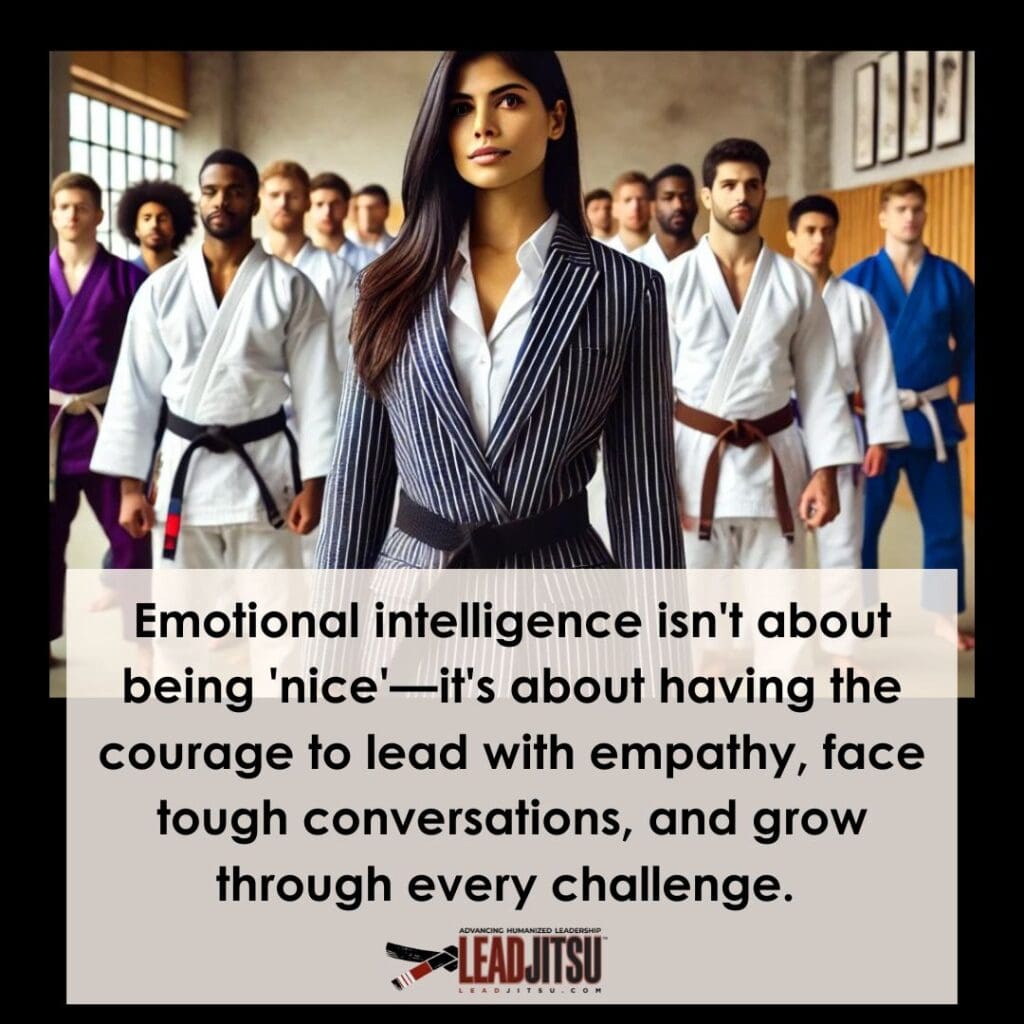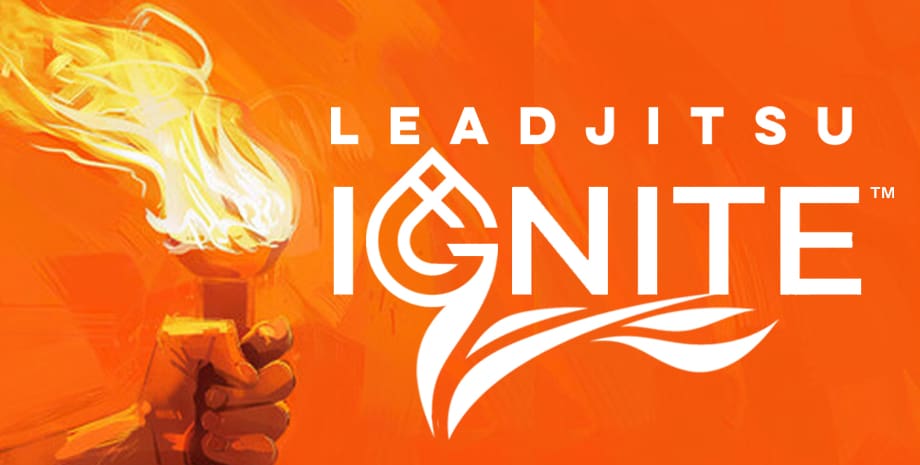What is emotional intelligence?
Emotional Intelligence (EI) is a term that has gained considerable traction in the world of leadership, but it’s also one of the most misunderstood concepts. Defined as the ability to recognize, understand, manage, and influence our own emotions as well as the emotions of others, emotional intelligence is often referred to as the cornerstone of effective leadership. But despite its growing popularity, many leaders and organizations still get it wrong.
In this comprehensive blog, we’ll dive deep into what emotional intelligence truly is, what it isn’t, and why understanding the difference is crucial for developing successful leadership strategies. We’ll also explore some of the common pitfalls and misconceptions surrounding EI and how LEADJITSU offers a fresh perspective on integrating emotional intelligence into leadership.
What Is Emotional Intelligence in Leadership?
At its core, emotional intelligence involves being aware of both your emotions and the emotions of those around you. It’s about more than just “reading the room”—it’s about understanding how emotions influence behaviors, decisions, and interactions. Leaders who are emotionally intelligent are better equipped to manage stress, resolve conflicts, and foster positive work environments.
Here are the key components of emotional intelligence in leadership:
Self-Awareness: Leaders with strong emotional intelligence are deeply aware of their own emotions and how they impact their thoughts and actions. They recognize their emotional triggers and understand how these emotions affect their leadership style.
Empathy: Empathy is the ability to understand and share the feelings of others. Leaders with high emotional intelligence can connect with their team on a deeper level, making them more approachable and better at resolving interpersonal issues.
Resilience: Emotional intelligence equips leaders to handle stress and setbacks without becoming overwhelmed. They remain calm under pressure and use adversity as an opportunity to grow and strengthen their leadership.
Effective Communication: Emotionally intelligent leaders are skilled communicators. They understand not just what needs to be said, but how it should be conveyed. This ensures that their message resonates and encourages productive dialogue.
Adaptability: Leaders with high EI are flexible and open to change. They adjust their leadership approach depending on the needs of the team, the situation, or the challenge at hand, while staying grounded in their core values.
These components combine to create a leadership approach that is both compassionate and results-driven, with a focus on long-term success.

What Emotional Intelligence Is Not
Despite its importance, emotional intelligence is often misunderstood. Many people equate it with simply being “nice” or avoiding conflict, but true EI requires much more nuance and strength.
Here are some things emotional intelligence is not:
Being “Nice” All the Time: Emotional intelligence is about being compassionate, but that doesn’t mean avoiding difficult conversations or sugarcoating reality. Leaders with EI confront tough issues with empathy, but they don’t shy away from the truth.
Avoiding Conflict: A common misconception is that emotionally intelligent leaders try to prevent conflict at all costs. On the contrary, leaders with high EI recognize that conflict is inevitable and necessary for growth. What sets them apart is their ability to navigate conflict with empathy and respect, ensuring that it leads to positive outcomes.
Suppressing Emotions: Emotional intelligence isn’t about ignoring or hiding emotions. It’s about managing emotions in a healthy way, allowing leaders to acknowledge what they feel while maintaining control of their actions. Suppressing emotions leads to burnout and disengagement, not better leadership.
Agreeing with Everyone: Leaders with high EI aren’t pushovers. While they value collaboration and input from their team, they don’t compromise their beliefs or values just to please others. Emotional intelligence allows leaders to stand firm on their convictions while still being open to new ideas.
A Quick Fix: Emotional intelligence isn’t something you master overnight. It’s a lifelong practice that requires ongoing self-reflection, feedback, and growth. Leaders who are committed to developing their emotional intelligence understand that it takes time and effort to truly integrate EI into their leadership style.
Why Do We Get Emotional Intelligence Wrong?
Given how often we talk about emotional intelligence, why do so many leaders get it wrong? One of the biggest reasons is that we often approach EI as if it’s about being agreeable or maintaining harmony at all times. This simplistic view overlooks the deeper aspects of emotional intelligence—such as resilience, adaptability, and the ability to have difficult conversations with empathy.
Here are a few reasons why we miss the mark on emotional intelligence:
Overemphasizing Harmony: Many leaders mistakenly believe that emotional intelligence is about keeping the peace, but true EI involves navigating conflict effectively and addressing difficult issues head-on.
Confusing Empathy with Agreement: Empathy is about understanding others, not always agreeing with them. Leaders with high EI can empathize with someone’s perspective while still making decisions that align with the broader goals of the organization.
Ignoring the Hard Work of Self-Awareness: Developing emotional intelligence requires leaders to take an honest look at their emotional triggers, biases, and blind spots. This self-awareness can be uncomfortable, which is why many leaders avoid it.
Underestimating the Power of Resilience: Leaders with strong emotional intelligence aren’t just good at managing relationships—they’re also resilient in the face of challenges. This resilience allows them to maintain their composure and keep their teams on track, even when things go wrong.
Skipping Practical Application: Many emotional intelligence training programs focus too much on theory and not enough on practical application. Leaders may understand the concept of EI but struggle to implement it in real-world situations. This is where programs like LEADJITSU Ignite come in, providing leaders with the tools to practice and apply emotional intelligence in meaningful ways.
LEADJITSU Ignite: Enter the Leadership Dojo
In the pursuit of humanized leadership, it’s not just about leading individually—it’s about creating a unified, thriving team. The LEADJITSU Ignite Leadership Team Intensive is a transformative six-month journey designed to harmonize your leadership team around core principles of respect, inclusivity, and communication. This program fosters a culture where leaders and their teams grow together, embracing a shared vision and driving sustainable success.
Empower your team to lead with heart, purpose, and unity. Let’s ignite this journey together. Schedule a complimentary consultation.
How LEADJITSU Gets Emotional Intelligence Right
At LEADJITSU, we understand that emotional intelligence isn’t just a theoretical concept—it’s a practical skill that leaders must develop and apply daily. Our leadership development programs, like LEADJITSU Ignite, are designed to help leaders master the real-world application of emotional intelligence through immersive, hands-on experiences.
Here’s how LEADJITSU takes emotional intelligence to the next level:
- Sensei Sessions: One-on-one mentoring sessions that provide leaders with personalized feedback on how they can improve their emotional intelligence in specific situations.
- Katas: Targeted workshops that focus on developing emotional resilience, empathy, and effective communication through real-world scenarios.
- Dojo Experience: An immersive, multi-month journey that helps leaders integrate emotional intelligence into their leadership style through consistent practice and reflectionEmotional Intelligence in Leadership
Emotional Intelligence in Leadership
Emotional intelligence is not about being nice or avoiding conflict—it’s about understanding and managing emotions, leading with empathy, and building resilient, adaptable teams. Leaders who develop high emotional intelligence can navigate the complexities of today’s business environment with confidence and compassion.
If you have a strong desire. to help elevate your team’s emotional intelligence, consider one of the most innovative emotional intelligence leadership training programs on the market. LEADJITSU Ignite is here to help. By combining emotional intelligence with practical leadership strategies, we equip leaders to lead with clarity, confidence, and resilience.
Book a consultation today!



